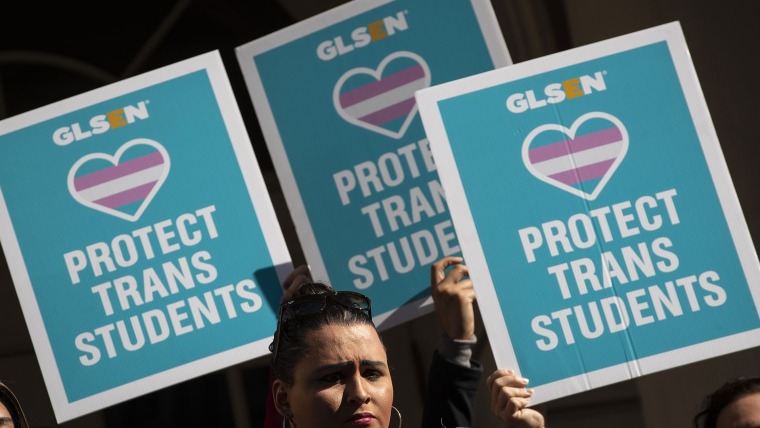5 companies showing true trans allyship by offering gender-affirming healthcare to employees
Netflix, Amazon and Starbucks are just a few of the most inclusive companies that offer gender-affirming care for trans employees.
Even though it is early in 2023, there have already been over 100 anti-LGBTQ+ bills introduced in the US. In the UK, trans issues remain in the headlines since the UK Government blocked Scotland’s progressive Gender Reform Act.
According to GLAAD, when trans people get the care they need, they are more likely to be working and almost 80 per cent see mental health improve. Transition is costly: in the US, top or bottom surgeries can cost up to $25,000. Other treatments and cosmetic surgeries often not covered by private insurance policies can be even more expensive. In the UK, it can take years to get a referral to seen at a gender identity clinic. It makes sense then that many employers are offering gender-affirming care as part of their benefits package.
The Human Rights Campaign Foundation have been tracking employers rated in their Corporate Equality Index (CEI) that have at least one transgender-inclusive benefit since 2002. Twenty years ago there were no companies that met any of their guidelines – fast forward to today and there are over 650 companies that have adopted gender transition guidelines and over 90 per cent of CEI businesses have at least one trans-inclusive policy on offer.
PinkNews has gone through the list for you to shine a spotlight on some companies offer gender-affirming care. No company is completely perfect when it comes to total inclusion. So when looking for a new role, make sure to research in more detail their policies and purpose.
Advertisement Remove ads

HSBC
Starting in 2023, the financial giant announced that it will pay for its trans employees’ gender-affirming care. The “gender dysphoria benefit” encourages trans and non-binary staff to “be their true authentic self.” The program will allow employees and dependants to apply to have their gender-affirming surgeries and other treatments paid for.
A spokesperson for the bank told PinkNews: “Our diversity is a defining feature of who we are and how we operate, and we are a proud and active supporter of customers and colleagues across the broad spectrum of diversity of sexuality and gender identity. By providing access to gender affirmation treatment, we hope that our trans and non-binary colleagues and their dependents are able to be their true authentic self.”
Amazon
The world’s largest retailer has been offering gender-affirming care for quite some time – since the 2010s. Benefits at Amazon begin on the first day of employment, including equal health coverage for transgender individuals.
In an effort to boost diversity, inclusion and support within the company, all employees have access to trans-inclusive resources. The ‘Transgender and Guidelines Toolkit’ offers information like terminology breakdowns to help cis colleagues understand phrases that could be brought up in conversation, name and pronoun use and a communication template for employees wanting to talk about their transgender identity. The guide was created by the company’s ‘Glamazon’ group, one of the world’s largest LGBTQ+ employee resource groups.
Amazon will also cover up to $4,000 in medical care travel costs for all US-based employees. This added coverage is for non-life-threatening treatments, including transgender care, abortions and substance abuse issues. This particular initiative came out of the US Supreme Court’s decision to overturn Roe v. Wade and the rise anti-trans laws in many states.

Netflix
While Netflix has a history of platforming anti-trans content (looking your way, Dave Chapelle), the streaming company has offered gender-affirming care for its employees since 2015. Coverage includes surgeries and HRT. Like Amazon, Netflix will reimburse colleagues in the United States up to $10,000 in travel expenses to receive care out of state.
The streaming giant that brought queer favourites like Heartstopper also has a dedicated employee resource group dedicated to trans colleagues. The Trans* Employee Resource Group (ERG) started in 2015 as a group on Slack and has evolved into a funded ERG that supports visibility for trans employees.
Starbucks
Since 2018, the world’s largest coffee shop that made the “frappuccino” a household name has covered gender-affirming care for trans employees. The Seattle-based company initially covered bottom surgery in 2012 and now includes all other steps in a person’s medical transition. These include “cosmetic” procedures that go uncovered by most insurance companies – including top surgery, hair transplants and removals, and facial feminisation surgeries. Not only that, the company will assist their trans employees in finding the appropriate doctors and healthcare providers.
It is worth noting that the company is allegedly threatening to cancel its gender-affirming benefits as over 150 stores in the United States have voted to join the newly formed Starbucks United Workers union.
Meta
The parent company of Facebook, Instagram and Whatsapp – recently rebranded as ‘Meta’ – has been offering specialised benefits for their transgender and non-binary employees since 2015. The company offers gender-affirming care for employees and their dependents through the employee benefits package including surgeries. The company also provides personal support for trans employees navigating all the paperwork that comes with medical transitioning.
While it has been a tough year for Meta, freezing hiring and making around 11,000 employees redundant, the company does offer up a solid work-life balance focused on wellbeing and stability for all its employees. What’s not to ‘like’?

These are just a handful of household names that offer gender-affirming care. There are hundreds of other companies that offer these transition benefits to trans employees including Tesla, EY, PwC, Ikea, Google and Airbnb.
